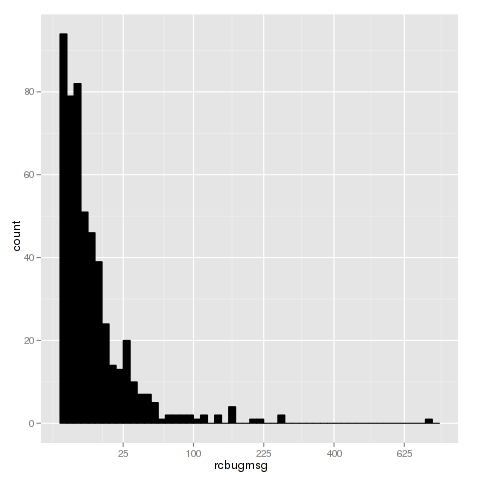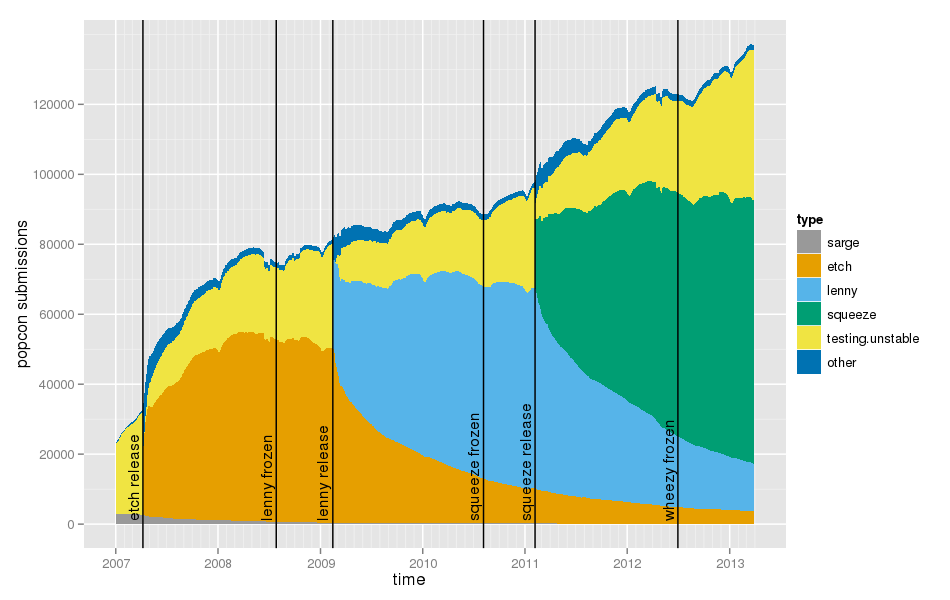Stefano Zacchiroli: apt-get install how-can-i-help
skyrocketing how-can-i-help popcon count
how-can-i-help
by Lucas Nussbaum
is one of the best things that happened in the area of
attracting contributions to Debian in quite a
while. It can be used both as a standalone tool to list
opportunities for contributing to Debian which are related to your
installed packages, and as an APT hook (which is also the default
configuration) that at each upgrade will inform you of new
contribution opportunities.
how-can-i-help is great for newbies who are
looking for ways to give back to Debian which are a good match for
their skills: among other things, how-can-i-help shows bugs tagged
"gift" related to packages you use.
how-can-i-help is also great for experienced
developers, as it allows them to find out, in a timely
manner, that packages they use are in dire need of help: RC bugs,
pending removals, adoptions needed, requests for sponsor, etc.
(As highly unscientific evidence: I've noticed a rather
quick turnover of RFA/O/ITA bugs on packages installed on my
machine. I suspect how-can-i-help is somehow responsible for that,
due to the fact that it increases awareness of ongoing package
issues directly with the people using them.)
So, if you haven't yet, please
apt-get install
how-can-i-help RIGHT NOW.
I daresay that we should aim at installing
how-can-i-help by default on all Debian machines, but that
might be an ambitious initial goal. In the meantime I'll settle for
making how-can-i-help's popcon count skyrocket. As
of today, it looks like this:
which is definitely too low for my taste. Please spread
the word about how-can-i-help. And let's see what we can
collectively do to that graph.
how-can-i-help is just a tiny teeny helper, but I'm convinced it
can do wonders in liberating dormant contributions to the Debian
Project.
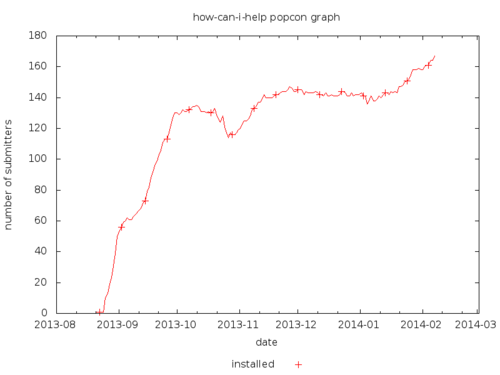
 One of my pet projects in Debian is the
One of my pet projects in Debian is the  Appointed to the Debian Tech Committee
I m pleased to announce that I ve been appointed to serve on the
Debain Technical Committee.
I d like to thank the other committee members and the Debian project
leader, Lucas Nussbaum, for giving me this opportunity to serve. I
look forward to working within the committee to further Debian s goals
as the universal operating system.
Appointed to the Debian Tech Committee
I m pleased to announce that I ve been appointed to serve on the
Debain Technical Committee.
I d like to thank the other committee members and the Debian project
leader, Lucas Nussbaum, for giving me this opportunity to serve. I
look forward to working within the committee to further Debian s goals
as the universal operating system.
 [no pictures here, just a short report].
Today DebConf, this year's edition of the annual Debian developer
conference, started with two inspiring talks about Debian proper, one by
Lucas Nussbaum, the other by Joey Hess.
This also means that yesterday DebCamp ended, the period preceeding
DebConf and dedicated to working on Debian together with others.
Here's a short report from my point of view:
I arrived here on Tuesday, the first day of DebCamp. I immediately fell
in love with the venue, & despite the early stage of setup, everything I
needed was working fine for me from the very start.
Like in previous years, I used the time to do work in the Debian Perl
Group, especially taking advantage of the presence of other team members.
That's the great thing about DebCamp & DebConf: collaborating in
real-life & real-time, from quickly asking a question over sitting
together to think about solutions for a problem to "just" chatting &
thereby developping ideas for the future.
In the previous days I
[no pictures here, just a short report].
Today DebConf, this year's edition of the annual Debian developer
conference, started with two inspiring talks about Debian proper, one by
Lucas Nussbaum, the other by Joey Hess.
This also means that yesterday DebCamp ended, the period preceeding
DebConf and dedicated to working on Debian together with others.
Here's a short report from my point of view:
I arrived here on Tuesday, the first day of DebCamp. I immediately fell
in love with the venue, & despite the early stage of setup, everything I
needed was working fine for me from the very start.
Like in previous years, I used the time to do work in the Debian Perl
Group, especially taking advantage of the presence of other team members.
That's the great thing about DebCamp & DebConf: collaborating in
real-life & real-time, from quickly asking a question over sitting
together to think about solutions for a problem to "just" chatting &
thereby developping ideas for the future.
In the previous days I
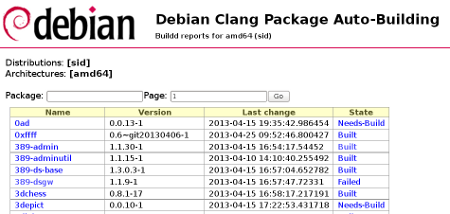
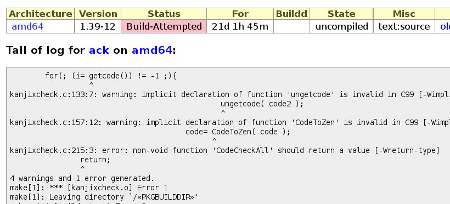 At time of writing, most of the packages in unstable have been rebuilt (16 % are remaining). However, due to resource constraints, only amd64 packages are built. Contact me if you have resources to share for other architectures.
Thanks to Paul Wise, the PTS (Debian package tracking system) proposes a link to the clang build logs (failing or not).
A repository will be automatically updated with the results of these builds (once I find the time to get into buildd).
2) clang-built repository
At time of writing, most of the packages in unstable have been rebuilt (16 % are remaining). However, due to resource constraints, only amd64 packages are built. Contact me if you have resources to share for other architectures.
Thanks to Paul Wise, the PTS (Debian package tracking system) proposes a link to the clang build logs (failing or not).
A repository will be automatically updated with the results of these builds (once I find the time to get into buildd).
2) clang-built repository I totally forgot it, but as the DPL elections are now done, we
have a winner for the
I totally forgot it, but as the DPL elections are now done, we
have a winner for the  As the first and third quantile are close together we can assume that the majority of the work is done by a few, especially since the second quantile is 5. This is supported by the histogram below, where the x axis is the number of recorded messages and y is the number of developers.
As the first and third quantile are close together we can assume that the majority of the work is done by a few, especially since the second quantile is 5. This is supported by the histogram below, where the x axis is the number of recorded messages and y is the number of developers.
